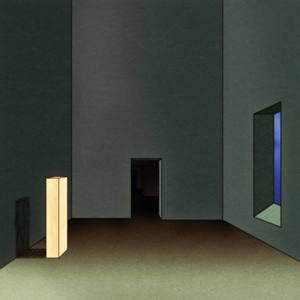Oneohtrix Point Never R Plus Seven
Albums like R Plus Seven are dangerous. It’s the kind of record that is unexpectedly […]

Albums like R Plus Seven are dangerous. It’s the kind of record that is unexpectedly original enough to enthrall and disrupt listeners in equal measure. Had it come from more obscure origins, it could very well have been deemed “difficult” and left to the graces of adventurous collectors scouring the Experimental section for years to come. Granted, Oneohtrix Point Never has never been a run-of-the-mill producer—2011’s unprecedented Replica, the captivating Returnal, and three-disc precursor Rifts all bore the idiosyncratic nuances and reckless abandon of a creator who apparently views and understands music differently than most other artists. But his latest LP distills all of that previous work into one manic, exhilarating, disorienting, sublime, frustrating, joyful, and singular experience. R Plus Seven at once references the freeform nature of ambient music, musique concrete’s stream of consciousness expressionism, and the methods of postmodern classical composers like Philip Glass and Steve Reich, though it’s more fitting to say the album operates in a reality all its own.
It would be unwise to look at R Plus Seven under a microscope. Even if the 10 tracks which make up its 43-plus minutes are so painstakingly detailed and finely rendered that they beg to be dissected, listeners will find few answers inside the disparate parts that coalesce into the existential terror of “Still Life” or the quiet introspection of “Along.” Oneohtrix Point Never’s latest opus is an exploration of illogical juxtapositions, an orchestration of musical fragments, and a place where astral beauty and the dread of the unknown are meant to simultaneously confront their differences and coexist. In so many words, Brooklyn artist Daniel Lopatin has explained that he’s interested in revealing how “totally out of control and chaotic” we actually are within a life we believe to be “efficient and perfect.” To that point, brute chaos interjecting perceived perfection is a common occurrence throughout R Plus Seven; however, if the album’s most prevalent overarching theme could be named in one word, it would be “disconnection.”
Essentially, Lopatin is a composer who is primarily interested in the possibilities of splicing together synthetic instruments, subliminal frequencies, and the inherent uncanniness of everyday sounds. He’s less interested in guiding his alien orchestras to a finessed crescendo than he is prone to hard cutting each melodic phrase, scrambling and twisting each rhythmic pattern, and running every chance of emotional catharsis into a strategically placed oblivion. On pieces like “Americans” and “Zebra,” something close to “traditional” songwriting and composition is frequently borrowed, but never used for very long. Cyclical patterns of new agey pan flutes, pianos, and harpsichords consistently prove Lopatin to be a virtuoso with form and melody, and his trademarked synth drifts are as stunning as ever. But all moments of familiarity are fleeting for the most part, serving largely as a counterpoint to more effectively highlight the utter pandemonium wreaking havoc within the music.
These kinds of ideas and techniques feed into the disconnections at work on the surface of R Plus Seven, but the theme goes deeper. Underneath the music’s jilted and bewildering structures, certain mental and conceptual disconnections are at the heart of the LP. For instance: The most commonly used sound across R Plus Seven is the human voice. It rampantly appears—singing, hiccuping, speaking, gasping, groaning, etc.—in all 10 of the tracks, but not a single syllable or vocal tone is “real,” so to speak. Whether sampled or synthesized, every voice—which, it should be noted, is the most organic musical instrument there is—was altered or constructed in some digital fashion, never once performed or recorded “live” for these compositions. There’s something subtly dissociative about listening to appropriated voices for nearly an hour, and Oneohtrix Point Never knows it.
The architecture of Lopatin’s LP is also built on a disconnected foundation. Bookending its mangled, eight-track center are two uncharacteristically linear songs, “Boring Angel” and “Chrome Country,” both of which rely heavily on massive church organs and choirs to reach their climaxes, as if they’re ushering us in and out of a holy place. True to form, Oneohtrix Point Never abruptly cuts off the rising organ melody at the end of his opener, an indication that we’ve crossed the threshold. And we practically never hear the sound again (it appears only once during a brief moment in the hyperactive “Problem Areas”) until the transcendent coda which sends off “Chrome Country,” wrapping up R Plus Seven in a bold and rapturous display of heavenly organ music. It’s the closest Lopatin allows his record to come to wide-eyed, unadulterated emotion, and plays out like a moment of collective absolution.
For all of its turbulence and dislocations, R Plus Seven is an astounding thing to behold, a perfectly imperfect and downright breathtaking masterpiece. It firmly establishes—or, more likely, reinforces—its creator’s status as a peerless artist. Fitting and admirable comparisons could be made to fellow neo-classical composer Tyondai Braxton, as well as Warp’s first inimitable innovator, Aphex Twin, but there’s still a quality to Oneohtrix Point Never that defies any direct classification. To borrow a trusty metaphor, Lopatin has mastered the task of fitting a square peg in a round hole. He doesn’t accomplish this by shaving off the edges of the peg or expanding the hole’s circumference—his trick is to move the playing field entirely. In Lopatin’s universe of fractured chronologies and impossible physics, the square peg was always meant to fit in the round hole. This is the place where R Plus Seven exists, and the best part about existing in a world of imperceptible logic is that there is no such thing as right or wrong.

